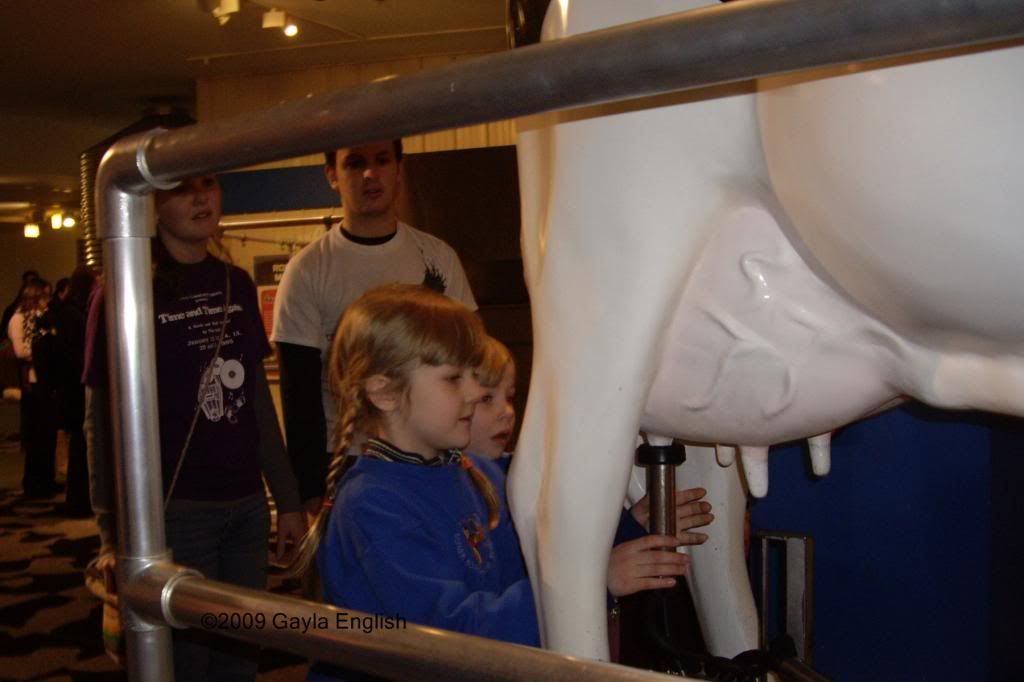 |
| Most town kids experience with livestock--in a museum |
Do you know
where your beef comes from?
Surprisingly, too many "town people" seem oblivious that their
thick steaks, juicy hamburgers, and tender roast beef used to walk around on
four legs and say, "Moo." I
never had that luxury—thankfully.
For most of
my years growing up, my family butchered a steer (or at least half of one) and
a hog each year. At that time, the only
plot of land my parents owned was a spot big enough for a house in town a block
or so from the golf course, but that did not stop my family. A very good friend of my dad's named Bob that
would sell one of his animals to my parents or would let them raise an animal
for themselves among his herds. Besides,
my parents helped him farm his land and clear brush along his woods just
because they were friends. Their
friendship was mutually beneficial in terms of companionship, trust, and reliability—and
of course, when it came to butchering.
My parents
researched how to divide and conquer both a side of beef and pork. Sometimes we even had diagrams hanging in our
kitchen from one year to the next. I
never had to help with the slaughtering, skinning, or gutting of an animal, but
sometimes I was near the farm lot when it was done. After it hung in the barn (or our garage in
town) to age in the cold, halves and quarters were wrapped in plastic sheeting
and brought to our house in the back of a pickup truck. Dad would carry (while Mom helped balance) each
quarter one at a time as needed to our basement
to be sawed, sliced, or ground to specifications and then wrapped. The wrapping and labeling: that's where I
came in. Sometimes I helped in the
trimming, too, when I got bigger. Of all
the things you could despise about this kind of operation, the only thing I
really didn't like was the cold. Of
course, the room had to be cold to keep the meat from getting warm and
spoiling, but that did not keep me from complaining. Fortunately, I did not usually have to help
if they were helping someone else, like Bob, butcher. Even though friends may have been using our
kitchen and my parents' knowledge, they were expected to be working alongside
to get the job done. That is one
principal of dividing and conquering a job that I carried with me into my
adulthood.
I knew most
town kids did not help butcher their families' meat supply for the year, but I
thought they at least knew how it was done.
They didn't. I was really shocked
to later learn that many farm kids had not helped do this either. Either they did not raise animals or they
took them to the locker plant to be butchered.
Although I was not pleased to admit it as a pre-teen, this whole
butchering experience was good for me.
As an adult, I have seen too many people have a distorted view of our
food supply and/or animals in general because they and their parents (and maybe
even their grandparents) had been too far removed from the hands-on experience
of processing their source of protein. These
days my parents do not have physical strength to manhandle hundreds of pounds
of meat, and I do not have the means to continue this tradition with my family.
However,
several years ago a friend of the family was raising hogs and was selling them
at a bargain price to friends. He would
slaughter, prepare, and age the hog, and we would just have to go in and help
butcher, trim, and wrap the meat. My
husband and I were thrilled--my girls, not so excited. Unfortunately, most of our girls did not get
an opportunity to help with this chore before our friends decided to get out of
the pork business. Processing our
family's food was only one benefit of this family experience.
Other
benefits included:
(1)
working together as a family,
(2)
happily communicating and relating to each other through the tedious process, (3) learning that an apparent
unpleasant task is not always that unpleasant,
(4)
developing the skill to be content and patient even if you are not being
entertained or if the activity does not center around personal desires,
(6)
understanding work, including hard work, is a normal part of life and should
not be shunned,
(7)
realizing the whole effort that goes into getting a sumptuous meal, and
(8)
taking time to be thankful for physical blessings and opportunities.
The ones
who did help have not forgotten the experience, but I am also mindful to remind
all of my girls the truth of where their food comes from. If you ask any one of them, she can tell you
where the beef comes from.
Read more 30 Day blogs starting with My Generation.
Read more 30 Day blogs starting with My Generation.
No comments:
Post a Comment